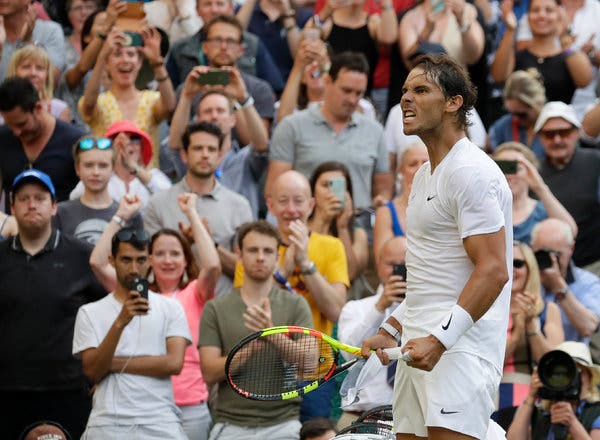Rafael Nadal Doesn’t Fall for Nick Kyrgios’s Bag of Tricks
The second-round duel at Wimbledon had something often lacking in this golden era of men’s tennis: an edge.
WIMBLEDON, England — The rematch was just about worth the five-year wait, as Nick Kyrgios and Rafael Nadal probed each other’s characters and explored the borders of their own talents in the second round of Wimbledon on Thursday.
Their duel had something often lacking in this memorable era of men’s tennis: an edge. But above all, the match, a 6-3, 3-6, 7-6 (5), 7-6 (3) victory for Nadal, offered an irresistible contrast in styles and — not to get too deep over a tennis match — philosophies of life.
Nadal, 33, has been maximizing his effort and his talent since he was a teenager. He has 18 Grand Slam singles titles to show for it, including two at Wimbledon, and wants nothing more than to rest his head on a pillow at the end of a day knowing that he has done all he could.
Kyrgios, 24 and unseeded at this tournament, still resists full tennis commitment and, despite his astonishing racket skills and easy power, has yet to advance past the quarterfinals of a major event.
Nadal is drawn to order and ritual, Kyrgios to disorder and the intoxication of improvisation.
Nadal treats all points like matters of state. Kyrgios treats some as if they don’t matter in the least.
“He doesn’t take one point off,” Kyrgios said of Nadal. “I feel like we’re the polar opposites.”
Perhaps that rally-by-rally focus was what made the small difference when they returned to the same well-tended patch of Centre Court grass where Kyrgios briefly rocked Nadal’s world in 2014 with a fourth-round upset. Kyrgios was 19 then and ranked 144th in the world.
“I think we have found the next guy in the men’s game,” John McEnroe said on the BBC broadcast of that match after watching Kyrgios rain down aces on Nadal, then the world No. 1.
It has not worked out that way. But Kyrgios is still nobody’s idea of an ideal opponent.
A flickering flame who tends to run hottest against the game’s biggest stars, Kyrgios was clearly inspired on Thursday, prepared to push and provoke Nadal out of his comfort zone.
That Nadal prevailed anyway was a tribute to his fighting spirit and his staying power. And despite some doubts during this rematch about the nature of the handshake to come, it turned out to be more civil than some of the other interactions in the late afternoon here.
Nadal and Kyrgios have criticized each other’s behavior in the past, most recently after a February match in Acapulco, Mexico. Kyrgios beat Nadal in three tight sets in the quarterfinals there, hitting an underarm serve and also getting medical treatment in a win that leveled their record against each other at 3-3.
Nadal said afterward that Kyrgios “was not a bad guy” but also said he “lacked respect for the public, his rival and also himself, and that is what he needs to improve.”
Kyrgios, in turn, has criticized Nadal’s speed of play and attitude in defeat. Before Thursday’s match Kyrgios said he was “not sure that Rafa and me could go down to the Dog & Fox and have a beer together,” referring to a Victorian-era pub in Wimbledon that Kyrgios visited on Wednesday night.
But when the two did share the same space on Thursday, their shotmaking was often spectacular.
Kyrgios had 29 aces, one of them with an underarm serve in the first set that caught Nadal by surprise. Kyrgios won another point with the tactic, which he has been bringing into vogue. But more than anything else, he relied on huge power, blasting one full-force forehand from the baseline directly at Nadal at the net. Nadal was forced to block the shot with his racket to defend himself.
Neither man had a break point in the final two sets, but Nadal was able to prevail in both tiebreakers and earn a spot in the third round against another dangerous, but much less combustible, opponent: Jo-Wilfried Tsonga of France.
Christopher Clarey has covered global sports for The Times and the International Herald Tribune for more than 25 years from bases in France, Spain and the United States. His specialties are tennis, soccer, the Olympic Games and sailing.

